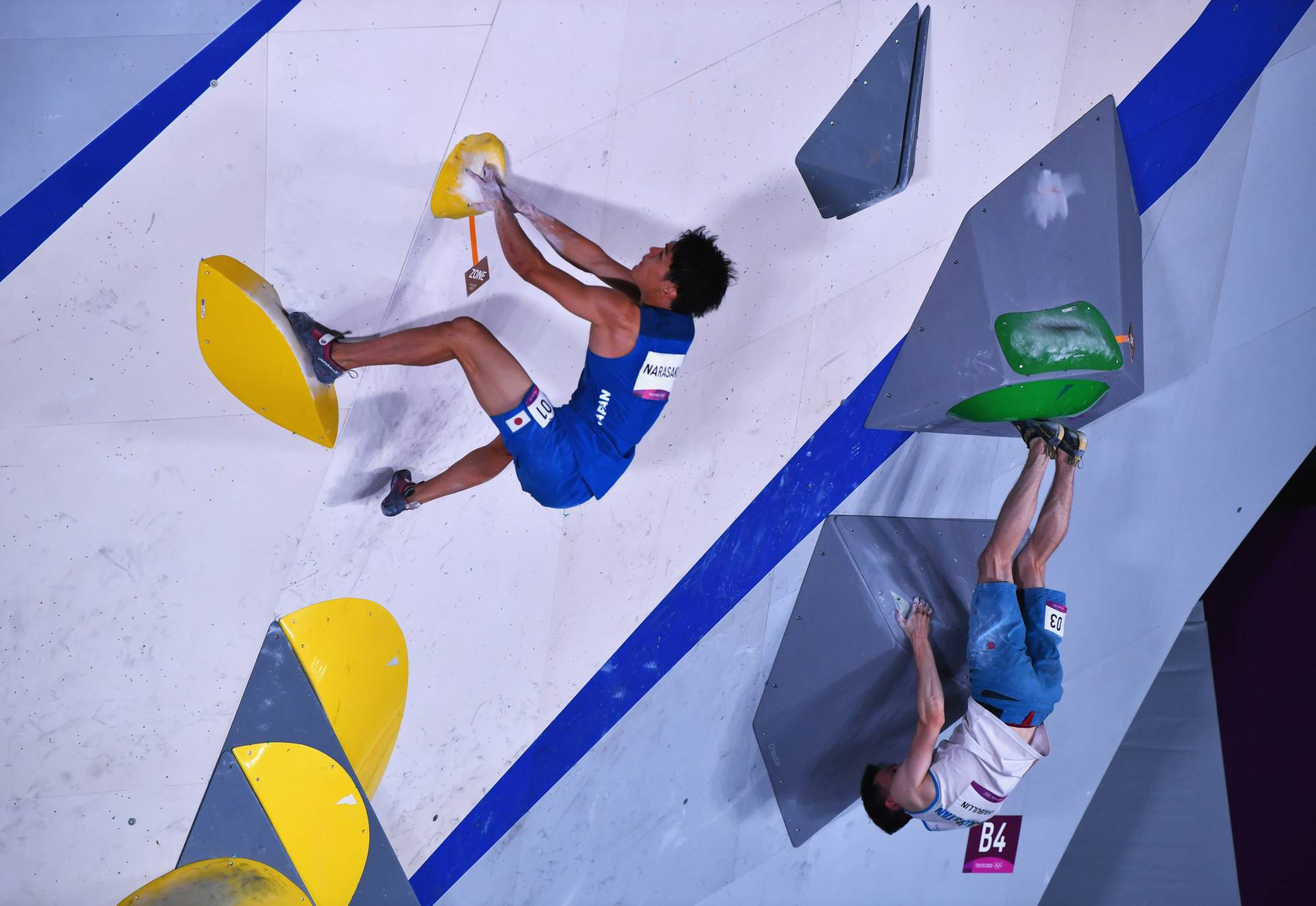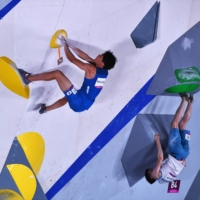There is a full-scale statue of an RX-0 Unicorn Gundam, a robot from the anime series Mobile Suit Gundam Unicorn, that stands, majestically some might say, in DiverCity Tokyo Plaza in Odaiba.
The giant white robot can be seen over the tops of trees from far away and stands at a height of 20 meters — only 5 meters higher than the walls being scaled at the first Olympic sport climbing competition that was taking place nearby in the robot’s line of sight.
Sport climbing has seen a big boost in popularity in both its competitive and recreational forms in recent years and could get another boost from being included in the Olympic Games.
“There are some advantages, there are some disadvantages,” said Adam Ondra, one of the world’s top climbers. “I think overall it will just help indoor climbing to grow, to be more accessible in different parts of the world. I think, of course I’m biased, but I think climbing is just an amazing sport and can improve the quality of life of so many different people. So I see the biggest benefit in that.”
Sport climbing is making its Olympic debut with a combined competition that consists of speed climbing, bouldering and lead climbing. The athletes will have their placements in each discipline multiplied and the climber with the lowest score will become the sport’s first Olympic champion.
France’s Mickael Mawem placed first in men’s qualifying with 33 points and was followed by Tomoa Narasaki, who had 56, and American Colin Duffy, who finished with 60.
The Olympic format, where there is only one medal awarded instead of one for each discipline, has been a source of contention for some in the climbing community, who would rather see the Games mirror the World Cup format.
“It’s a nice introduction to climbing,” U.S. climber Nathaniel Coleman said. “I’m excited for it to be gone.”
Twenty athletes took part in men’s qualifying, with the top eight punching tickets to Thursday’s final. Women’s qualifying begins Wednesday with the final scheduled for Friday.
Speed climbing is a simple sprint to the top of a 15-meter wall.
French brothers Bassa and Mickael Mawem placed high on the speed wall, clocking top times of 5.45 and 5.95 respectively. They were two of only three athletes to finish under six seconds. The other was Narasaki, Japan’s gold medal contender, who sped up the wall in 5.94 seconds.
The best climbers went from hold to hold with such speed and fluidity it was as if they were doing their best Spider-Man impressions.
Speed bears little resemblance to the other two disciplines and many are against having it as one of the deciding factors for the gold medal.
Ondra is among the great climbers who struggles in the discipline and it showed on Tuesday, when he finished 18th out of 20 with a top time of 7.46 seconds.
“It feels a little bit like the others are kind of starting 100 meters ahead,” Ondra said. “Because there is this speed climbing that I’m definitely not talented at. I was trying really hard during the last two years to improve in this kind of climbing, but I have a certain limit. I’m actually pretty happy with my speed climbing performance. Let’s see if there will be any chance not to be last in speed climbing the day after tomorrow.”
In bouldering, the athletes have a fixed amount of time to reach the end of four routes, or problems, featuring climbing holds of differing sizes. The routes were of increasing difficulty — one section on the fourth problem saw athletes hang upside down and then pull themselves up to get their feet on the hold.

Night had fallen by the time bouldering began — with the Gundam putting on a light show in DiverCity Tokyo Plaza — and the wall was illuminated by bright lights as the competition continued.
Mickael Mawem and Narasaki were standouts here as well. Mawem solved three of the four problems while Narasaki reached two summits in six attempts.
In lead, athletes have to make it as far as possible up a 15-meter wall in a certain amount of time.
Jakob Schubert and Duffy each made it past 42 holds in that event, with Schubert placing first.
As if the wall didn’t present a tough enough challenge, Tokyo’s humidity could make things difficult in the final on Thursday.
“We know all these holds,” Ondra said. “So we know how it should feel and it feels like you’re just sliding off. You just don’t feel comfortable on a wall.”
In a time of both misinformation and too much information, quality journalism is more crucial than ever.
By subscribing, you can help us get the story right.
SUBSCRIBE NOW
KEYWORDS
2020 Tokyo Olympics, Tomoa Narasaki




